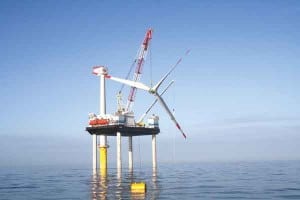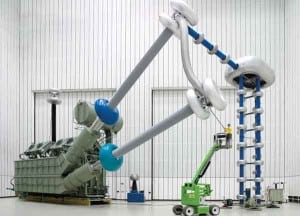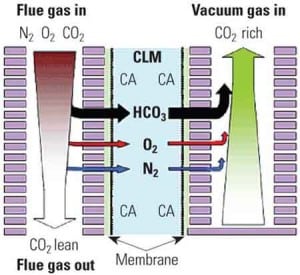Latest
-
News
AREVA Makes Debut in Renewables with German Offshore Turbines
The first six of a dozen high-capacity turbines were commissioned in mid-December at the 60-MW Alpha Ventus project in the North Sea, Germany’s first offshore wind park. All 12 turbines of the €250 million project are already standing, put up in just seven months by a consortium of EWE, E.ON, and Vattenfall — formally known as Deutsche Offshore Testfeld und Infrastruktur (DOTI).
-
News
Of Floating Power Barges and Ships
More than 60 floating power stations are in operation around the world, deploying some 4 GW at continental shores where electricity is most needed. Though these feature a variety of power sources (including nuclear, gas, and heavy fuels), most are power barges — they do not have their own propulsion systems and would have to be towed to desired locations.
-
News
The Age of the 800-kV HVDC
High-voltage direct current transmission (HVDC) has come a long way since 1882 when the first of its type carried power from Miesbach in Bavaria to an electricity exhibition in Munich, 57 kilometers (km) away, at a mere 1,400 V. Last December, just before the world ushered in the new decade, Siemens Energy and grid operator China Southern Power Grid put into operation the first pole of a transmission link between the southern Chinese provinces of Yunnan and Guangdong, a 1,418-km ultra-high-voltage direct current (UHVDC) system. That line has a transmission capacity of 5 GW, and it operates at a voltage of 800 kilovolts (kV) — a world record.
-
-
News
California Releases Preliminary GHG Cap- and-Trade Rules
California’s Air Resources Board (ARB) in late November issued the nation’s first blueprint for a broad-based cap-and-trade program to control greenhouse gases (GHG). If they take effect in 2012 as proposed, the regulations in ARB’s preliminary draft will apply to 605 of the state’s largest stationary GHG emitters, including power plants and industries, as well as electricity imports. Starting in 2015, the regulations will also apply to fuel suppliers and smaller stationary GHG emitters such as homes and commercial businesses.
-
News
Carbon Capture Technology Based on a Blood Enzyme
The way our lungs separate and capture carbon dioxide from blood could be key to isolating emissions of the greenhouse gas in order to store them safely underground.
-
News
New Polymers Could Mop Up Radioactive Isotopes
Scientists from Germany and India say they have developed a new polymer that reduces the amount of radioactive waste produced during routine operation of nuclear reactors. The approach uses small beads of the material to "fish" out radioactivity from water pumped through the reactor’s core.
-
News
Job Site Material Recycler
The new EZ Grout Hog Crusher Job Site Material Recycler from Multiquip is easily attached to a skid steer loader or forklift and can recycle most materials — brick, block, stone, rock, asphalt, non-reinforced concrete, and more — on the job site. The Hog Crusher is able to scoop up and pulverize recyclable material in […]
-
News
Laser Pulley Alignment Tool
Seiffert Industrial’s new laser pulley alignment tool, Pulley PRO, uses a green laser beam for maximum angular resolution and for reliable and accurate readings. The lightweight and compact units magnetically attach to the inside or outside face of any pulley or sprocket and have no small parts or targets that can get lost. A laser […]
-
News
Mildew-Resistant Epoxy
Sherwin-Williams introduced the Tile-Clad High Solids Mildew Resistant epoxy, an industrial coating that protects against mildew growth on exterior surfaces where dampness and humidity are of concern. The epoxy is well-suited for areas where mildew growth must be guarded against in order to maintain operations, such as water tank exteriors, structural and support steel, power […]







